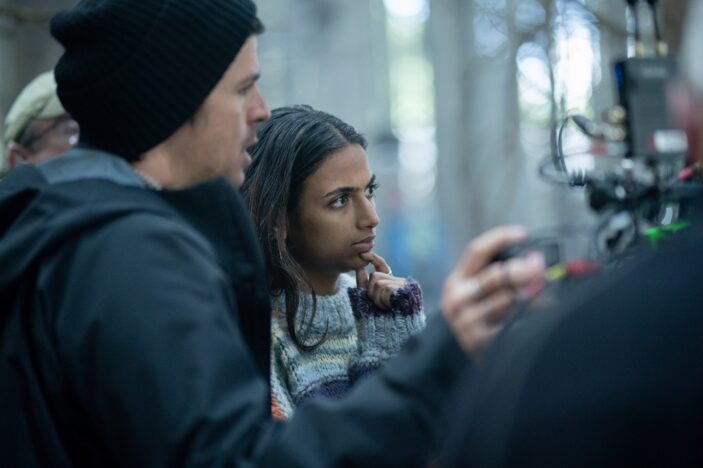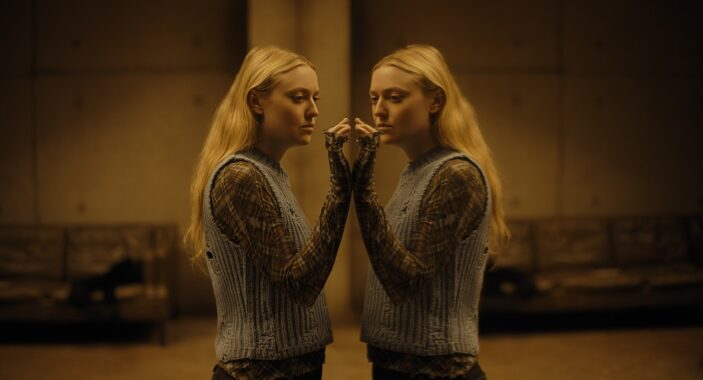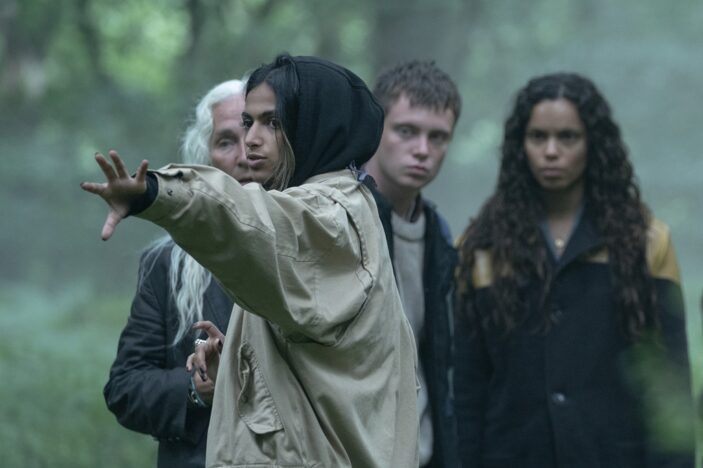
From producer M. Night Shyamalan comes The Watchers, written for the screen and directed by Ishana Night Shyamalan and based on the novel by A.M. Shine. The film follows Mina (Dakota Fanning), a 28-year-old artist, who gets stranded in an expansive, untouched forest in western Ireland. When Mina finds shelter, she unknowingly becomes trapped alongside three strangers who are watched and stalked by mysterious creatures each night.
You can’t see them, but they see everything.
As The Watchers unveil themselves across Australian cinema screens this week, Peter Gray spoke with Ishana about the pressure she felt in adapting the novel, what she learned from working on her father’s film sets, and if she was able to experience The Sixth Sense untouched from spoilers.
The trailer for The Watchers is obviously nicely ambiguous, which works well for the genre. I haven’t read the novel, and without giving anything away, was there much of a deviation from the source material?
At the end of the day, I feel like I returned to a form of the story that I think feels like quite similar to the book itself. The book is so wonderful, so it was very much a journey of using what (A.M. Shine) had already built in his structure and his characters, and then just shift it a bit to be more suited for a theatrical space. I was thinking about the book as it was and placing that in a cinema space.
Is there a sense of pressure or responsibility when you’re adapting a novel? You don’t want to upset the author, but you also want to put your stamp on it.
Absolutely. I think, for me, I felt very early on that if he (Shine) felt the way I do about my projects, there’s probably a great sense of wanting to make sure it’s okay and being afraid of putting it in someone else’s hands. I was empathising with him very early on. We ended up becoming great friends, and he’s the loveliest guy. He’s been such an integral part of making the movie. He was on set. We hung out. It’s just been such an ideal relationship between us two.
I always find that the creatives I have spoken to that have dabbled in the horror space, they are always the nicest people! The nicest people have the darkest minds. I guess it’s just a great way of doing or saying all the things you’d never get to.
(Laughs) Definitely! I feel the same way. The people that make macabre art are very, very lovely. I do think it’s because you get to put your darker emotions somewhere else. It’s cathartic to not hold onto those feelings anymore. That’s what it is for me.
The Shyamalan name is synonymous with the twist ending. The reveal. The Watchers is no exception. So many people hold The Sixth Sense as one of the greatest endings of all time, and I have to ask if you were able to watch that film without it being spoiled?
(Laughs) Yes, I did. I think I watched it when I was around 10 or 11. It was a while after it had come out. Somehow (my dad) was able to keep us from knowing what it was going to be like. I was able to watch it with very fresh eyes. I was totally surprised and enamoured by the film, just like everyone else.

You’ve directed episodes of Servant, and you served as Second Unit Director on Old and Knock at the Cabin. They’re all films that fall within the various subsects of the horror genre. Was that love of the genre born from any one thing specifically?
It kind of existed in my life for as long as I can remember. As a child I always felt really connected to horror stories. That was always something I enjoyed reading. I often wonder is it nature vs nurture? Is it something I was born with? Was it imposed upon me? I don’t really have the answer. For me, it’s always given me a great sense of peace when I watch something that scares me. I think there’s an element of not being as afraid of art than what’s going on in your mind.
Anything recent that you read or watched that stuck out for you?
Hmmm, I don’t know. There’s so much wonderful horror out there today. I always say that The Ring was always a big one from my childhood that terrified me! That was just a scary movie! I still look to that as an example of mastery in how to tell a horror story, and it’s structure and playing with the expectation of fear.
Speaking of expectations, that was something I noticed with The Watchers in that I don’t know who or what is exactly going on! Obviously there is the novel to work off of, but with a reveal in a story like this, is it one of those situations where you think of the “twist” first and then work your way back as to how to get to that?
It was an evolving process to me. I spent a lot of time on the script and working out the structure of “when you see what”, you know? It was always my intention from the very beginning to play with restraint as much as possible. In horror, your imagination is always so much scarier than anything you could be shown. Particularly now, when we have seen so much stuff. It’s like that Jaws approach. I want you to sit in that unease. That’s my type of horror. I love that feeling of perpetual unease.

The look of this film is actually quite beautiful. The mirrors in the house must’ve been difficult to navigate when you realise how much reflection there is to work off?
It wasn’t the main challenge, but it was a mathematical issue that we spoke of early in prep. We had that interior structure where one entire wall is mirrored. You were always seeing the camera, so we had to figure out how to shoot around that so we didn’t have to take it out (in post-production). We had cameras inside and outside. Sometimes we had them behind the actors and we were mirroring each movement of the other camera. There was lots of little tricks embedded throughout the process, and I think it gives the movie that sense of the audience not knowing what’s real. The mirror imagery confuses people about their perception of reality, and I think that’s a great by-product of the approach.
And you filmed this across Ireland. Was there a specific reason for that as a filming location?
The book is set in Ireland, and the author himself is from Galway, and I think one of the most compelling things about the book is this exploration of a world I’ve never been to before. The mythology here is very specific to Ireland (too), so I’m always of the belief that places carry an essence to them and that translates on film. So, how can we get the most of this environment to tell this story? It was never a question. I always knew I wanted to film this there.
The casting here. I think people keep forgetting that Dakota Fanning has more to her than this incredible career as a child actress. She’s still working now. She’s such an interesting choice. How did she come about for you?
She was very much someone who just came to my mind. I’ve always loved her energy and her work, and I feel like she has one of those personas that’s just built for cinema. A camera goes on her and she’s incredibly compelling. You can’t take your eyes off of her. And it’s been that way since she was a child. I was interested in seeing her as this sophisticated adult actress and putting her in this world. It was incredibly exciting for me. I felt so lucky that she said yes. She’s just a brilliant, brilliant lady.
And having worked on Old and Knock at the Cabin, as mentioned earlier, was there anything you learned specifically on those sets, in that role, that you brought with you to your own work? Anything that truly surprised you that prepared you as a director?
I learned so many things over those years. Those experiences almost shaped me. The lesson that I learned over and over, and the main thing I brought into The Watchers, is that prep is so important. Once you’re actually shooting the movie it moves so fast. You can never prep enough. It was really the approach of technique over hands-on. Just know every shot you want to shoot, and why you want to shoot it. Think it through, because then you can be more free when you’re actually shooting. That was one of the main lessons.
The Watchers is screening in Australian theatres from June 6th, 2024.
